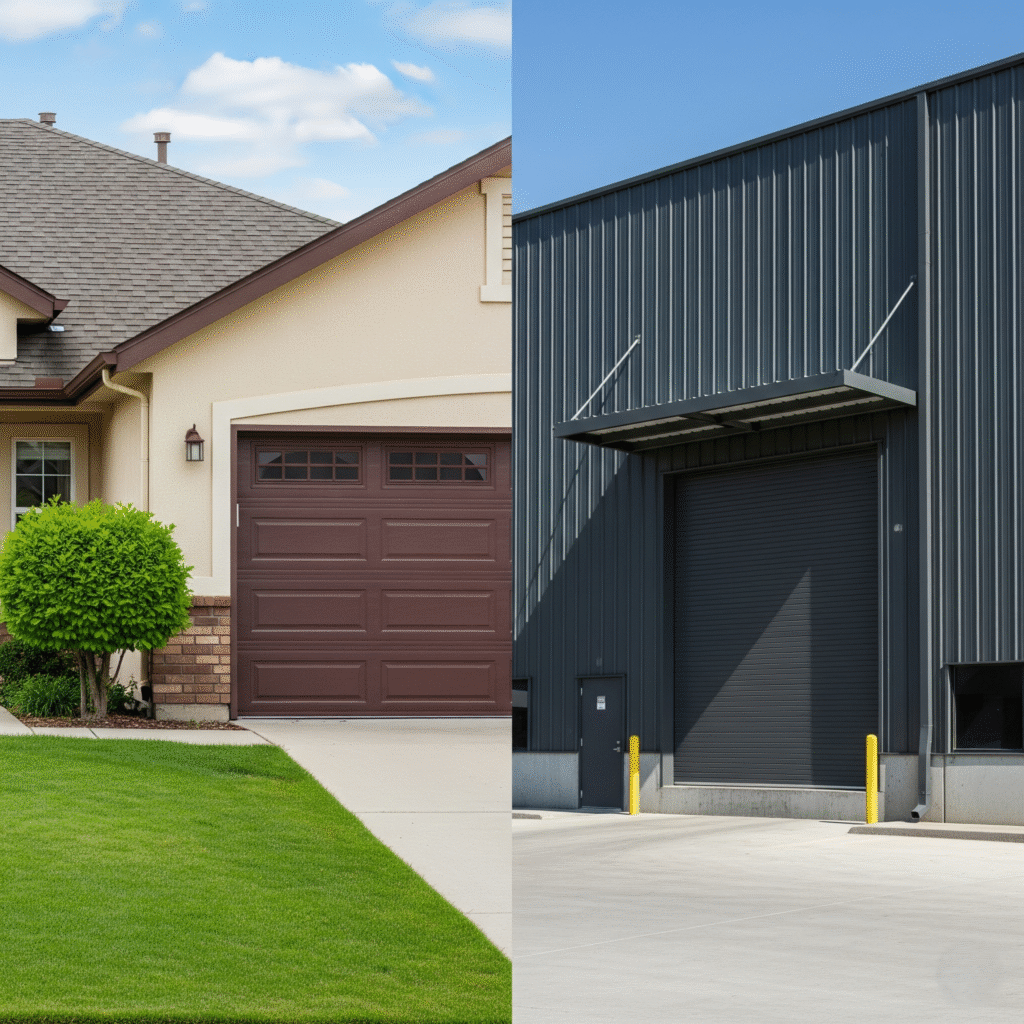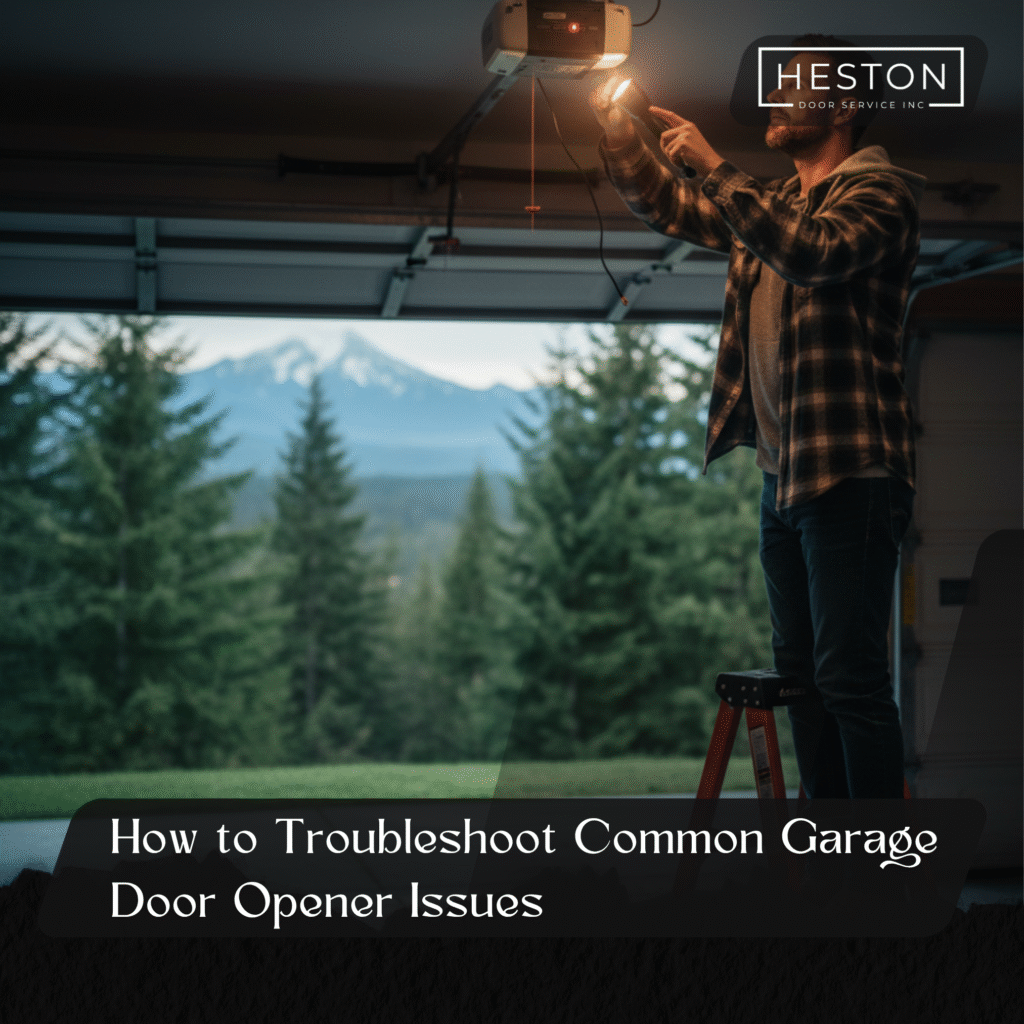Garage doors may look similar at first glance, but residential and commercial systems are built for very different purposes. From size and design to durability and functionality, the installation process varies greatly depending on whether the property is a home or a business.
In Washington’s areas, where diverse properties range from suburban homes to busy warehouses and commercial facilities, knowing these differences is essential. Professional installation ensures your garage door is not only functional but also secure, efficient, and built to last.
At our company, we specialize in both residential and commercial garage door installations, providing tailored solutions for each property type. Here’s what sets them apart.
Size and Scale Differences
Residential Garage Doors
- Typically range from 7–8 feet high and 8–16 feet wide.
- Designed to fit one- or two-car garages.
- Lighter materials and standard openers suffice for everyday household use.
Commercial Garage Doors
- Can exceed 14 feet in height and 30+ feet in width.
- Built for large equipment, trucks, and heavy traffic.
- Require industrial-grade openers and reinforced tracks.

Design and Appearance
Residential Installations
- Style and curb appeal play a big role.
- Homeowners often choose from a variety of colors, window inserts, and decorative finishes.
- Materials include wood, steel, fiberglass, or aluminum, balanced between aesthetics and durability.
Commercial Installations
- Functionality comes first.
- Most doors are plain, industrial-looking steel or aluminum.
- Some businesses opt for glass-panel doors (such as auto shops) to allow visibility and light.
Material Strength and Durability
Residential Doors
- Built to handle 3–5 daily open/close cycles.
- Emphasis on quiet operation and insulation for energy efficiency.
Commercial Doors
- Must withstand 50+ cycles per day in high-traffic facilities.
- Constructed from heavy-duty steel, aluminum, or reinforced composite materials.
- Prioritize strength, impact resistance, and minimal downtime.
Insulation and Energy Efficiency
- Residential Doors: Focus on keeping garages comfortable and reducing household energy costs. Insulated panels help maintain indoor temperatures.
- Commercial Doors: Prioritize efficiency in temperature-controlled warehouses or businesses that store sensitive goods. Insulation also reduces utility expenses for large facilities.
Safety and Security Features
For Homes
- Safety sensors to prevent accidents with children or pets.
- Smart openers with Wi-Fi integration for remote access.
- Moderate security features suitable for residential neighborhoods.
For Businesses
- Advanced locking mechanisms and heavy-duty materials for security.
- Fire-rated or high-wind-rated doors for industrial safety compliance.
- Automated systems are integrated into business security and access control.
Installation Process
Residential Garage Door Installation
- Usually completed in a single day.
- Standard parts and openers make replacement or upgrades relatively quick.
- Customization focuses on appearance and insulation.
Commercial Garage Door Installation
- More complex and time-intensive.
- Requires specialized equipment like lifts and reinforced hardware.
- Involves compliance with building codes, safety regulations, and business-specific requirements.
Cost Considerations
- Residential Doors: More budget-friendly, depending on materials and style. Decorative designs and smart features may increase cost.
- Commercial Doors: Higher upfront investment due to size, durability, and specialized features. Long-term savings come from durability and lower repair frequency.
Why Professional Installation Is Essential
Whether residential or commercial, garage doors must be installed correctly to function safely and efficiently. DIY or low-quality installations often lead to:
- Misalignment and uneven wear.
- Reduced the lifespan of parts and openers.
- Safety hazards for families or employees.
- Voided manufacturer warranties.
Professional installation ensures:
- Correct setup of tracks, springs, and openers.
- Compliance with local building codes.
- Reliable long-term performance.
- Peace of mind knowing your property is secure.
Choosing the Right Garage Door for Your Needs
- Homeowners in Washington’s areas should consider aesthetics, insulation, and quiet operation.
- Business owners should focus on durability, security, and compliance with safety regulations.
Our team helps you make the right choice, providing expert recommendations based on your property’s unique requirements.

Final Thoughts
While both residential and commercial garage doors serve the same purpose, security and access, they differ significantly in scale, design, materials, and installation complexity. Homeowners benefit from style and energy efficiency, while businesses need strength, security, and reliability.
By working with our experienced team in Washington’s areas, you’ll get the right door installed with precision and care, ensuring safety and long-lasting performance.
Call to Action
Don’t take chances with something as critical as your garage door. Whether you need a residential garage door installation to enhance your home’s curb appeal or a commercial garage door installation built for heavy-duty use, our team is ready to help. Contact us today for a consultation and get professional installation services you can trust in the Washington area.





